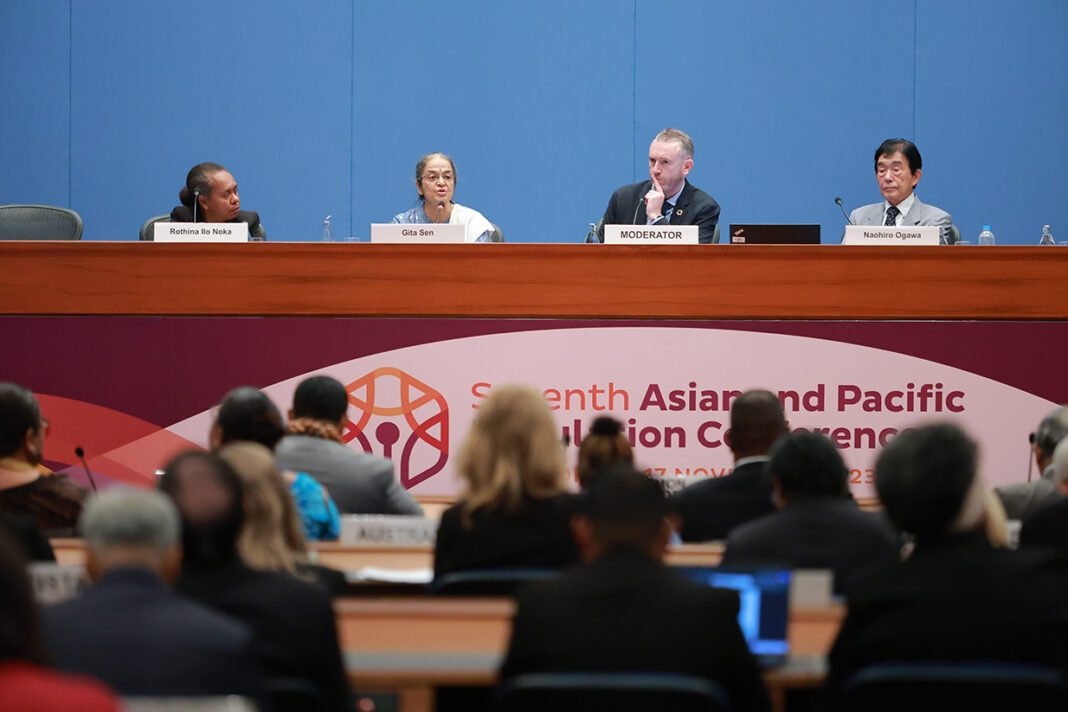By: Asim Nawaz Abbasi
BANGKOK: Participants of the Seventh Asian and Pacific Population Conference underscored the significance of population and development in a region home to more than 60 per cent of the world’s inhabitants, noting that decisions made by countries in this region shape the future of its 4.7 billion individuals as well as future generations across the globe.
The gathering reviewed the implementation of the Asian and Pacific Ministerial Declaration on Population and Development (2013) and the Programme of Action of the International Conference on Population and Development (1994). The three-day conference was jointly organized by the Economic and Social Commission for Asia and the Pacific (ESCAP) and the United Nations Population Fund (UNFPA), and brought together more than 400 government officials and representatives of civil society and youth groups.
Amidst the discussions, youth participants brought a fresh dynamism to the conference, passionately advocating for inclusive policies and action plans. They emphasized the urgency of addressing pressing issues like climate change, social inequality, and access to education and healthcare. Expressing their determination to be active contributors to shaping their future, young leaders highlighted the need for platforms where their voices are not just heard but actively integrated into policy-making processes. Their enthusiasm and innovative ideas resonated throughout the event, echoing a call for intergenerational collaboration to create a more equitable and sustainable world for all.
“Beyond sheer numbers, this gathering reflects our shared commitment to addressing the population dynamics in our region. The collective resolve, constructive dialogues, and solution-oriented approach evident throughout the conference underscore our potential to make substantial contributions to ICPD30 and position ourselves for the post-2030 population and development agenda,” said Lin Yang, ESCAP Deputy Executive Secretary, during the closing of the conference.
The regional conference provided an opportunity to celebrate successes. Since the previous conference, convened ten years ago, Asia and the Pacific have seen increased life expectancy, along with a decline in maternal mortality, enhanced access to contraceptives and more girls going to school. These changes have occurred due to increased socioeconomic development, advancements in gender equality and people gaining greater agency to make decisions, including about their sexual and reproductive health.
Delegates acknowledged that the following megatrends are affecting economic, social and environmental outcomes: shifting population dynamics, the intensifying climate crisis, increasing migration, growing urbanization and rapid digital advancement. Moreover, they noted that inequality and social injustice persist. The message was clear: Forward-looking policies that capitalize on the demographic transition and place individual rights and choices at the centre are key to building sustainable and thriving societies and economies.
Additionally, partnerships across the region to exchange experiences, increase investments and accelerate progress and disaggregated data were noted as critical to achieving shared goals.
“Strengthened regional collaboration is required now more than ever. And that is exactly what we have seen over the last week. The energy, spirit and genuine interest that each of you have shown to work together to advance the quality of life of every individual that calls this region home is promising,” said UNFPA Deputy Executive Director (Programme) Diene Keita, bringing the conference to a close.



